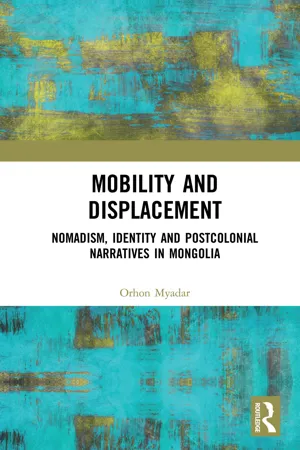
Mobility and Displacement
Nomadism, Identity and Postcolonial Narratives in Mongolia
- 120 pages
- English
- ePUB (mobile friendly)
- Available on iOS & Android
About This Book
This book explores and contests both outsiders' projections of Mongolia and the self-objectifying tropes Mongolians routinely deploy to represent their own country as a land of nomads.It speaks to the experiences of many societies and cultures that are routinely treated as exotic, romantic, primitive or otherwise different and Other in Euro-American imaginaries, and how these imaginaries are also internally produced by those societies themselves. The assumption that Mongolia is a nomadic nation is largely predicated upon Mongolia's environmental and climatic conditions, which are understood to make Mongolia suitable for little else than pastoral nomadism. But to the contrary, the majority of Mongolians have been settled in and around cities and small population centers. Even Mongolians who are herders have long been unable to move freely in a smooth space, as dictated by the needs of their herds, and as they would as free-roaming "nomads." Instead, they have been subjected to various constraints across time that have significantly limited their movement. The book weaves threads from disparate branches of Mongolian studies to expose various visible and invisible constraints on population mobility in Mongolia from the Qing period to the post-socialist era. With its in-depth analysis of the complexities of the relationship between land rights, mobility, displacement, and the state, the book makes a valuable contribution to the fields of cultural geography, political geography, heritage and culture studies, as well as Eurasian and Inner-Asian Studies.
Winner of the Julian Minghi Distinguished Book Award (AAG, 2022)
Frequently asked questions
Information
Table of contents
- Cover
- Half Title
- Title Page
- Copyright Page
- Dedication
- Contents
- Foreword
- Acknowledgments
- List of figures
- Introduction
- 1 Mongolia, environment, and nomadism
- 2 Making of nomads: the nomad figure and habitus
- 3 The nomad figure as the imagined "Other"
- 4 Performing the nomadic identity
- 5 Mobility, displacement, and colonial violence: the Qing colonial period (1650s—1911)
- 6 In the Soviet shadow (1921-1991)
- 7 Fenced land: discourse of land in post-socialist Mongolia (1990-present)
- Conclusion: whence the land of nomads
- Bibliography
- List of Mongolian words
- Index